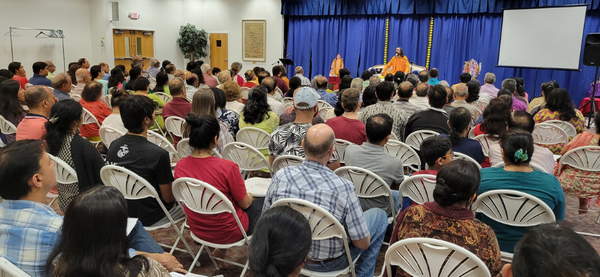Those of us who do not understand the cause and effect of the thoughts steer our lives towards adverse circumstances, and utilize the God-given resources fighting those. Challenging situations are a part of life. How we approach these situations either helps or hinders our progress in life. Moreover, how we think is what determines our response. Therefore, we need to be cognizant of each thought, revamp our thinking pattern, and learn how to respond authentically.
The Power of Thoughts
“What are thoughts? Thoughts are subtle bundles of energy created in the factory of the mind. The atmosphere around us is full of energy waves. These are not visible to the naked eye. However, if we take a radio and start turning the channel tuner, radio stations appear in quick succession thereby proving their existence. The waves are all there, though we cannot see them. Similarly, thoughts are subtle wave generated by the mind.
Thoughts fructify into actions. They are the internal seeds from which all actions spring. It is a very simple principle. Good thoughts fructify into good actions and bad thoughts fructify into bad actions. For example, those who dedicate their lives to the service of humankind do not land up in that noble profession by chance. For years, they cultivate compassionate thoughts in their mind, and the energy of those accumulated thoughts result in their performing heroic deeds of sacrifice and service. Similarly, those who engage in theft and murder naively blame circumstances for their sins. They harbor sinful thoughts in their minds, and circumstances align themselves for the fulfillment of their desires.” [†]
Therefore, if we wish to draw more favorable circumstances and improve our actions, we must begin by improving our thoughts. Hence, Shree Krishna advises:
उद्धरेदात्मनात्मानं नात्मानमवसादयेत् |
आत्मैव ह्यात्मनो बन्धुरात्मैव रिपुरात्मन: ||
uddhared ātmanātmānaṁ nātmānam avasādayet |
ātmaiva hyātmano bandhur ātmaiva ripur ātmanaḥ ||
(Bhagavad Gita 6.5)
“Elevate yourself through the power of your mind, and not degrade yourself, for the mind can be the friend and the enemy of the self.” Hence, we need to cultivate noble and sublime thoughts in our mind.
Tend to Your Mind Garden
“The mind may be likened to a garden, which can either be intelligently cultivated or allowed to run wild. Gardeners cultivate their plot, growing fruits, flowers, and vegetables in it. At the same time, they also ensure that it remains free from weeds. Similarly, we must cultivate our own mind with rich and noble thoughts, while weeding out the negative and debilitating thoughts. If we allow resentful, hateful, blaming, unforgiving, critical, and condemning thoughts to reside in our mind, they will have a debilitating effect on our personality. We can never get a fair amount of constructive action out of the mind until we have learned to control it and keep it from becoming stimulated by anger, hatred, dislike, etc. These are the weeds that choke out the manifestation of divine grace within our hearts.
People imagine that their thoughts are secret and have no external consequences because they dwell within the mind, hidden from the sight of others. They do not realize that thoughts not only forge their inner character but also their external personality. That is why we look upon someone and say, “He seems like a very simple and trustworthy person.” For another person, we say, “She seems to be very cunning and deceitful. Stay away from her.” In each case, it was the thoughts people harbored that sculpted their appearance. Ralph Waldo Emerson said: “There is full confession in the glances of our eyes, in our smiles, in salutations, in the grasp of the hands. Our sin bedaubs us, mars all the good impressions. Men know not why they do not trust him. The vice glasses the eyes, demeans the cheek, pinches the nose, and writes, ‘O fool, fool!’ on the forehead of a king.” Another powerful saying linking thoughts to character states:
“Watch your thoughts, for they become words.
Watch your words, for they become actions.
Watch your actions, for they become habits.
Watch your habits, for they become character.
Watch your character, for it becomes your destiny.”
It is important to realize that we harm ourselves with every negative thought that we harbor in our mind. Same way, we uplift ourselves with every positive thought that we dwell upon.” [*] Each thought we dwell upon has consequences; therefore, it’s vital to veer the mind from negative emotions.
The Law of Karma
“Life is like a book that constantly teaches us lessons. You would have noticed that nothing in life and in this world is constant. We are incessantly pushed to grow and evolve. As soon as we learn one lesson, the next one is presented to us. Having come in this world, improve we must, as the entire creation is geared towards it. For those who are not amenable to learning, this world becomes the ‘University of Hard Knocks,’ where they are forced to improve the hard way, through difficult experiences. But those who keep their focus on inner refinement do not waste their energy in cursing circumstances. They aim to quickly learn the lesson inherent in the situation, and progress rapidly forward on the journey of internal growth and development.”
Therefore, circumstances come in our life for a purpose, and they remain until the purpose is served. When we have learned the lesson that was intended for us, the set of circumstances naturally fall away to give rise to another set of circumstance, which carry in them another lesson.
Everyone is a mixture of virtues and frailties. Similarly, situations too are myriad webs of intricate constraint and opportunities. Many situations are the result of our karmas (past actions) either in the present lifetime or in prior ones. If we had sinned grievously in the past, painful situations come, to teach us that actions have consequence.
People who do not understand this cause-and-effect chain keep fighting with circumstances. They accuse situations for all their miseries, feeling woefully victimized. They fail to understand that the Law of Karma is very just and takes all our actions from all past lifetimes into account. Where we are in life today is the result of our thoughts and actions in the past. And our thoughts today decide where we will be in life tomorrow. Rather than play the blame game or curse the lady luck, we must focus on improving ourselves. The more we win our inner victories, the more we will find external success knocking at our door. Thus, thought by thought, we forge our destiny!” [†]
† H. H. Swami Mukundananda. “The Need for Mind Management.” Art of Mind Management, Plano: JKYog, 2017, pp. 6-18. Print.
* H. H. Swami Mukundananda. “Chapter 17: Śhraddhā Traya Vibhāg Yog.” Bhagavad Gita: The Song of God, Plano: JKYog, 2013, pp. 534-535. Print.







